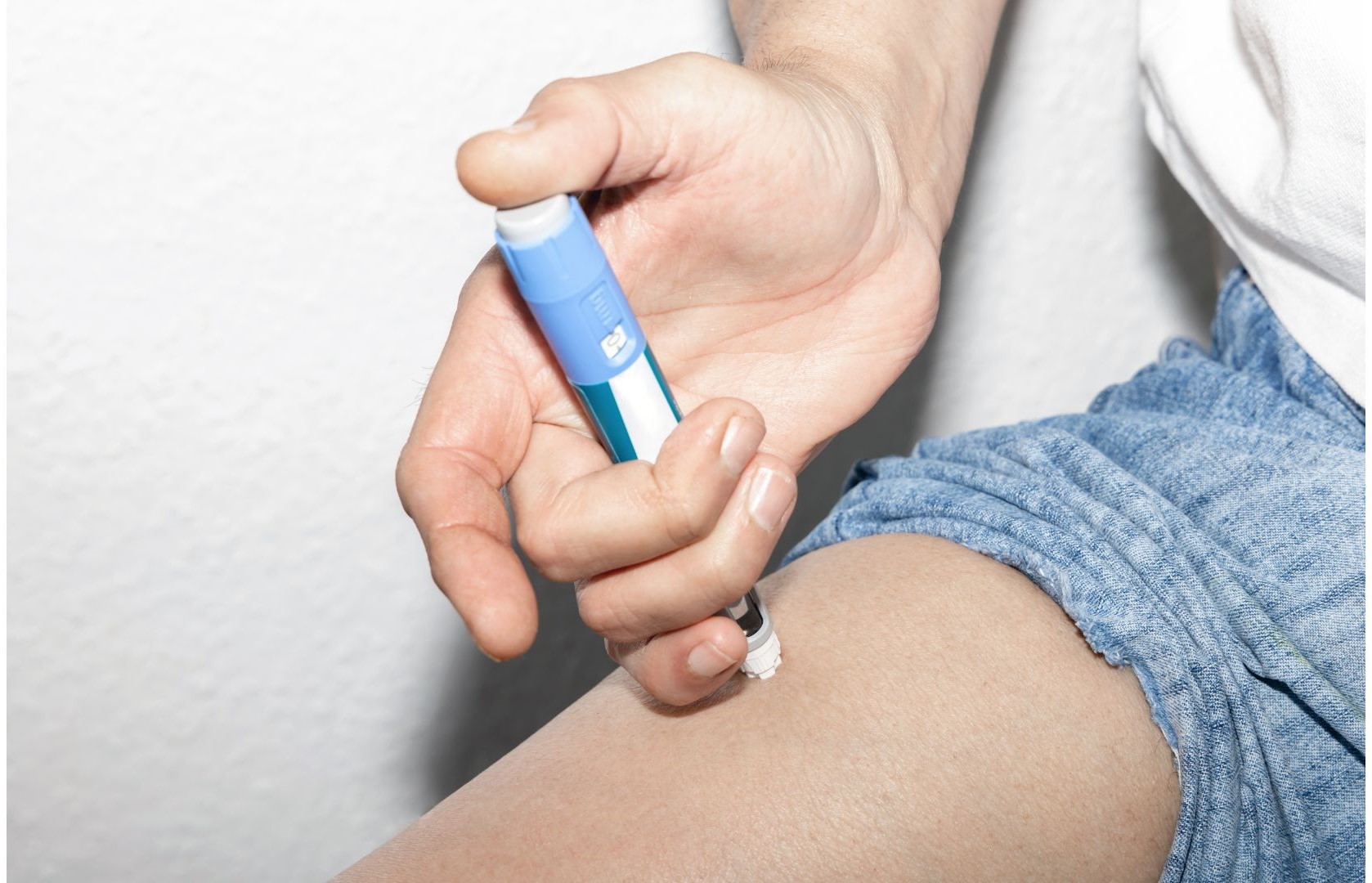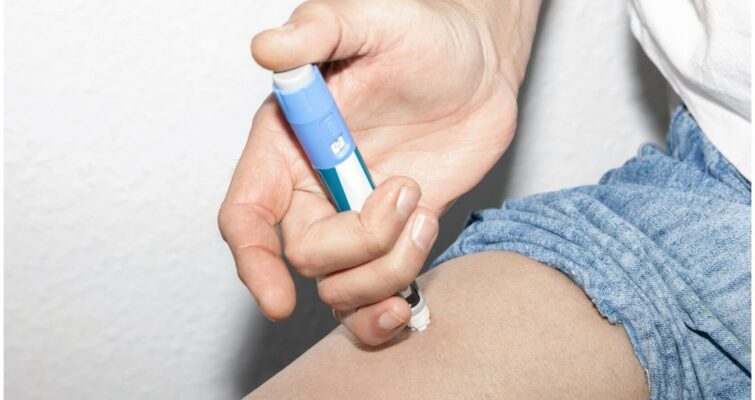The explosive popularity of weight loss peptides like Ozempic, Wegovy, & Mounjaro in recent years has transformed the weight management landscape for patients and doctors alike. It seems like women everywhere are clamoring for these drugs, but in a growing trend, they’re not seeking to only lose weight.
Recently, there’s been growing curiosity about the possibility of using Ozempic in smaller doses—known as microdosing—for managing symptoms of perimenopause. But why the interest in perimenopause? And what could microdosing Ozempic offer that traditional treatments might not?
Ozempic benefits beyond weight loss
Ozempic, a medication originally designed for people with type 2 diabetes. It’s primarily used to help control blood sugar levels, which in turn helps patients lose weight. With its active ingredient, semaglutide, Ozempic works by mimicking the effects of a natural hormone in your body (called GLP-1), helping regulate insulin and suppress appetite. This dual-action property makes it a unique contender for other potential uses beyond just managing diabetes.
In studies, Ozempic has also been shown to benefit (1, 2, 3, 4):
- Heart health
- Cognitive function
- Fatty liver disease
- Polycystic ovary syndrome (PCOS)
- Alzheimer’s prevention
With all these potential benefits, it’s no wonder that women in perimenopause are curious about the potential of micro-dosing Ozempic for their symptoms. So why might Ozempic be a helpful treatment?
Perimenopause can be challenging to navigate
Perimenopause is a natural hormone shift marking the end of a woman’s reproductive years. It typically begins in a woman’s 40s but can start earlier for some. During this time, the ovaries gradually produce less estrogen, leading to a range of symptoms like irregular periods, hot flashes, mood swings, sleep disturbances, and weight gain.
Many women experience heightened stress and anxiety, compounded by a lack of understanding and support from those around them.
Traditionally, hormone replacement therapy (HRT) has been the go-to treatment for alleviating perimenopausal symptoms. However, it may not be suitable for everyone. Lifestyle changes are also beneficial, but these may not provide the comprehensive relief many women seek.
Read: Is It Adrenal Fatigue or Perimenopause?
Tailoring dose to meet individual needs

In recent years, there’s been a shift towards exploring other treatments for perimenopause, and micro-dosing Ozempic can check a significant number of boxes when it comes to finding relief from symptoms. Micro-dosing involves administering smaller doses of a medication to achieve desired effects without the full potency, and with fewer (or no) side effects. It’s basically a much, much lower dose (about a quarter of what’s usually given) that allows a practitioner to tailor the amount of the drug to meet the needs of the patient.
The rationale behind micro-dosing Ozempic for perimenopause still centers on its ability to regulate appetite and promote weight management. Weight gain during perimenopause is a common concern, which is exacerbated by hormonal changes. By enhancing insulin regulation and blood sugar balance, micro-dosing Ozempic could help alleviate one significant aspect of perimenopausal challenges.
Plus, the hormone-mimicking properties of Ozempic might provide significant respite from other perimenopausal symptoms, such as mood swings and energy dips (5).
Related: How to Lose Weight During Perimenopause & Menopause
Potential benefits of microdosing Ozempic
Early findings and anecdotal evidence using very low doses of these peptides are promising. Let’s outline a quick overview of the potential benefits:
- Weight management. By curbing appetite and promoting a feeling of fullness, micro-dosing Ozempic can aid in controlling weight gain associated with hormonal changes.
- Emotional well-being. Many perimenopausal women experience mood swings and anxiety. Reports suggest a positive correlation between microdosing Ozempic and improved emotional health (5).
- Reducing the risk of metabolic complications. Ozempic improves insulin sensitivity and reduces inflammation (6), which could mitigate the increased risk of diabetes and cardiovascular issues experienced during perimenopause.
- Cognitive health. The hormone-regulating properties of Ozempic appear to have a positive effect on cognitive function, which can decline during midlife and after (7).
- Improved overall quality of life. The combination of weight management, emotional well-being, and potential benefits for metabolic and cognitive health contribute in a big way to an improved overall quality of life for women in midlife.
It’s important to note that while these potential benefits are promising, they are not yet backed by extensive clinical studies specifically looking at women in midlife. As with any medication or treatment, it’s essential to consult with a qualified healthcare provider before starting microdosing Ozempic.
Read: How to Boost Your Brain Power Naturally
Considerations and precautions for using Ozempic in perimenopause
While microdosing semaglutide or other GLP-1 receptor agonists presents an exciting avenue for managing perimenopause symptoms, we need to consider your individual circumstances before prescribing. Weight loss peptides are still a drug, and it’s crucial to work with a healthcare practitioner who has experience in this area—and with perimenopause.
An integrative or holistic doctor can evaluate whether microdosing Ozempic is appropriate based on personal health history, existing medical conditions, and any other current medications. It’s also vital to monitor any potential side effects, which may include nausea, fatigue, or mild gastrointestinal discomfort. Though, the benefit with microdosing is that it reduces the likelihood of side effects also.
Microdosing relies on achieving the right balance for you instead of approaching these peptides with a one-size-fits-all regimen. Be prepared to follow up regularly with your provider when you start treatment.
Related: Berberine vs. Ozempic—A Natural Alternative to Semaglutide?
How to safely access and microdose Ozempic
If you’re considering micro-dosing Ozempic as part of your perimenopause management plan, taking a structured approach is vital. They can also guide you on the appropriate starting dose and offer ongoing monitoring.
Prescriptions should always be obtained legally through licensed healthcare professionals or pharmacies. Avoid purchasing medications from unverified online sources, as this can expose you to counterfeit or unsafe products.
Consistency in administration is key. Follow the prescribed dosing schedule, and keep track of any changes in symptoms or side effects. Transparency with your healthcare provider is essential for adjusting treatment plans and optimizing outcomes.
What to Remember
Navigating perimenopause can be a complex and often overwhelming journey. Micro-dosing Ozempic presents a novel approach, offering hope to women seeking relief from symptoms. Though still in the early stages of research, the potential benefits—ranging from weight management to emotional well-being—make it an exciting area of exploration.
Empowering yourself with knowledge is the first step toward making informed health decisions. Consider discussing micro-dosing Ozempic with your healthcare provider, and explore the broader field of integrative medicine. After all, even though perimenopause isn’t a condition to be treated, you can still support your body and pave the way for a smoother transition.


